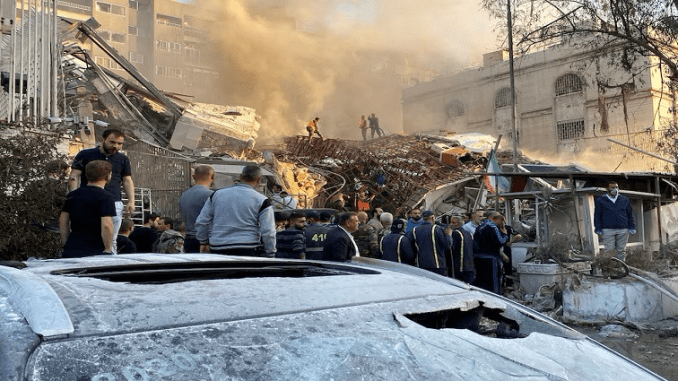
The attack on Iran’s embassy in Syria yesterday, which Iran claimed killed seven of its military advisers, including three senior commanders, was carried out by suspected Israeli airplanes. This was a significant step up in Israel’s conflict with its neighbors in the region.
Reporters on the scene in Damascus’ Mezzeh neighborhood observed rescue personnel scaling the debris of a demolished structure within the diplomatic complex, which is next to the main Iranian embassy structure.
There were emergency trucks parked outside. Near the wreckage, an Iranian flag was flying from a pole.
Syrian Foreign Minister Faisal Mekdad and the country’s interior minister were spotted at the scene. “We strongly condemn this atrocious terrorist attack that targeted the Iranian consulate building in Damascus and killed a number of innocents,” Mekdad declared.
The ambassador of Iran to Syria stated that his apartment was on the top two floors of the consular building within the embassy compound, which was struck by the strike.
Seven Iranian military advisors perished in the attack, according to a statement from Iran’s Islamic Revolutionary Guard Corps. Among them was Mohammad Reza Zahedi, a senior commander in the Quds Force, an elite paramilitary and overseas spy unit.
Israel has frequently attacked Iran’s military facilities in Syria as well as those of its allies, but this attack on Monday was the first time Israel had attacked the sizable embassy complex itself.
It has intensified those strikes concurrently with its campaign against the Palestinian organization Hamas, which is backed by Iran. According to Israeli accounts, Hamas launched the Gaza War on October 7 by attacking Israel, killing over 1,200 people and kidnapping 253.
Palestinian health authorities report that Israel’s offensive in Gaza has claimed the lives of over 32,000 Palestinians.
Israel’s armed forces have increased their bombings in Syria against the Iranian-backed Hezbollah and the Islamic Revolutionary Guard Corps, both of which favor Syrian President Bashar al-Assad.
Usually, Israel keeps its military attacks against Syria under wraps. “We do not comment on reports in the foreign media,” an Israeli military official stated in response to a question regarding the strike.
Four unidentified Israeli officials were quoted by the New York Times as admitting that Israel was the perpetrator of the attack.
A “flagrant violation of the United Nations Charter, international law, and the foundational principle of the inviolability of diplomatic and consular premises,” according to Iran’s UN mission, was committed by the strike.
The Iranian delegation asked the UN Security Council to denounce the attack, describing the strike as “a significant threat to regional peace and security” and stating that Tehran had the right “to take a decisive response.”
Hezbollah, a Lebanese organization believed to be Iran’s most potent armed stooge in the area, promised to strike back. The gang released a statement saying, “This crime will not pass without the enemy receiving punishment and revenge.”
Along with Russia, the Muslim countries of Iraq, Jordan, Oman, Pakistan, Qatar, Saudi Arabia, and the United Arab Emirates denounced the attack.
Hossein Akbari, Iran’s unhurt ambassador to Syria, had earlier told Iranian state TV that Tehran will respond “harshly” to the five to seven deaths, including those of diplomats.
According to Iranian official media, Tehran thought Zahedi was the intended victim of the assault. Along with four others, his deputy and another senior officer were also slain.
Up until 2016, Zahedi headed the Quds Force in Lebanon and Syria and was a military advisor in Syria, according to Iran’s Arabic-language Al Alam Television.
Tensions in the Region
Speaking on behalf of the US State Department, Matthew Miller stated that while Washington was still “concerned about anything that would be escalatory or cause an increase in conflict in the region,” the strike was not anticipated to have an impact on negotiations to rescue Israeli captives held by Hamas.
Regarding whether the attack on the Iranian embassy premises will lead to noticeably more bloodshed, analysts were split.
According to Jon Alterman of the CSIS research tank in Washington, Israel likely believes that such strikes serve as deterrents and lessen the likelihood of a bigger conflict rather than increasing it.
He stated, “The Israelis are certain that if they try to retreat, the threat will increase rather than decrease.” “They are convinced that their enemies will be deterred as long as they do something like this periodically.”
But there was room for escalation, according to Steven Cook, an expert at the Council on Foreign Relations in Washington.
He stated, “The IRGC can relax restrictions on proxies in Iraq and Syria, putting American forces in danger once more.” “The Iranians may also order Hezbollah to intensify its increasingly audacious and frequent attacks against Israel.”
Leave a Reply